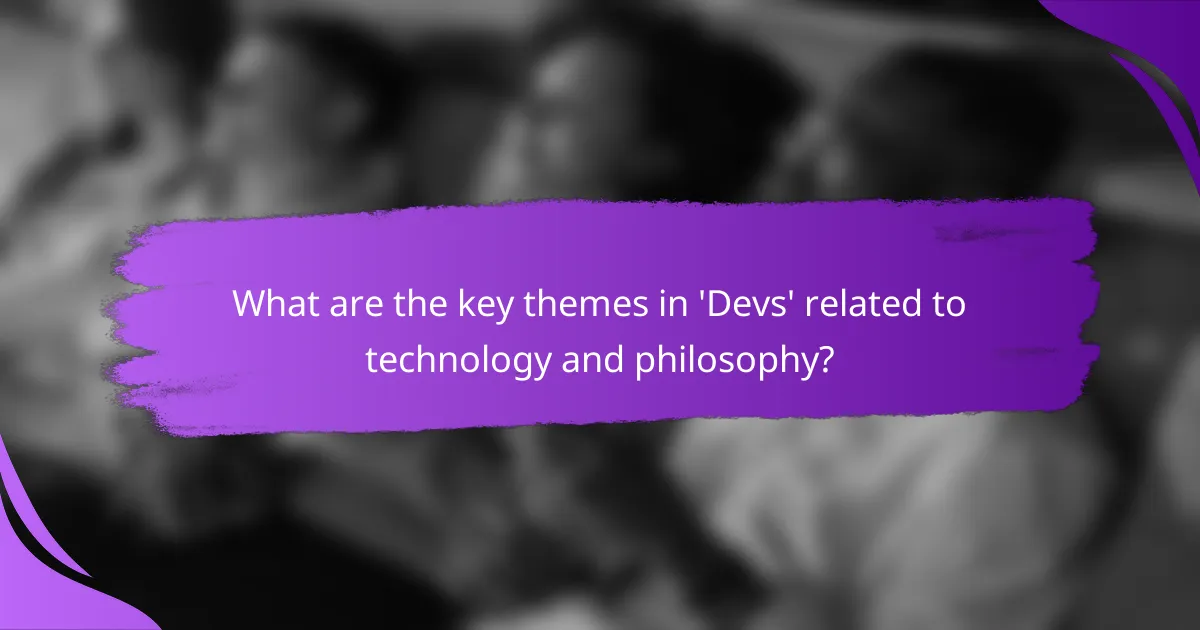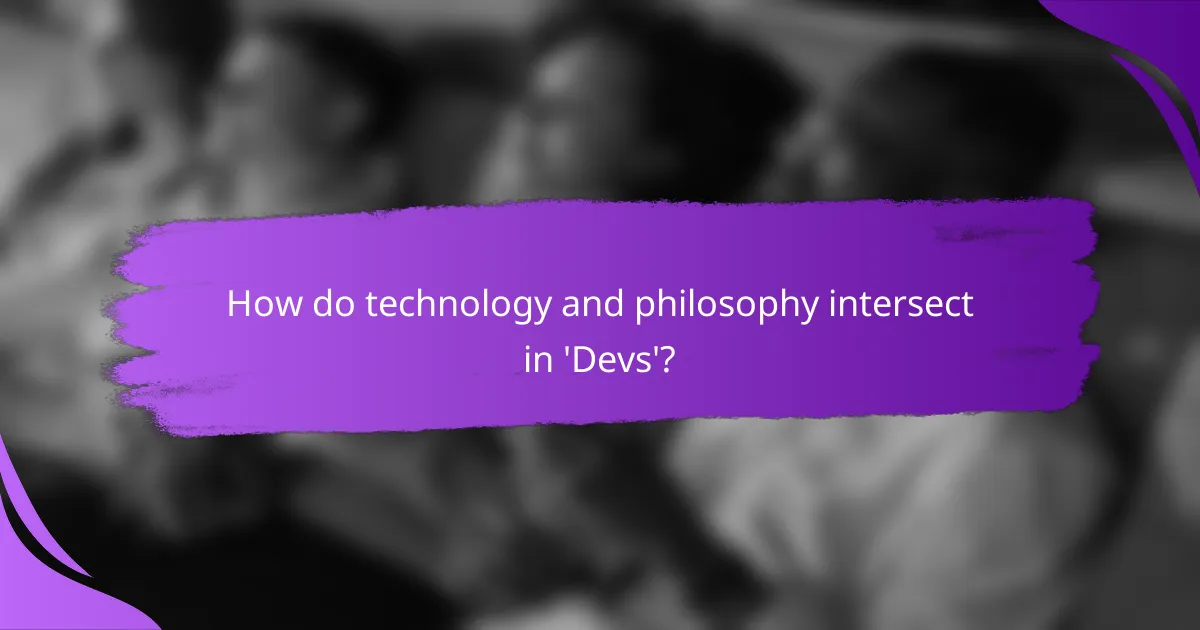The article examines the series ‘Devs’, which explores the intersection of technology, philosophy, and corporate ethics. Central themes include determinism versus free will, highlighting how technology, particularly quantum computing, can predict human behavior and raise ethical questions about agency. The narrative critiques corporate power in the tech industry, addressing the moral implications of surveillance and data manipulation. By delving into these themes, ‘Devs’ encourages reflection on the societal impact of technological advancements and the ethical dilemmas they present. The series serves as a cautionary tale about the potential consequences of unchecked technological influence.

What are the key themes in ‘Devs’ related to technology and philosophy?
The key themes in ‘Devs’ related to technology and philosophy include determinism, free will, and the ethics of technological advancement. The series explores how technology can predict and control human behavior. It raises questions about the nature of free will in a deterministic universe. The narrative examines the moral implications of corporate power over technology. It also delves into the consequences of using technology without ethical considerations. These themes are illustrated through character dilemmas and the overarching corporate environment. The philosophical inquiries reflect real-world debates surrounding AI and surveillance. Overall, ‘Devs’ presents a complex interplay between technological capability and philosophical inquiry.
How does ‘Devs’ explore the concept of free will?
‘Devs’ explores the concept of free will through its narrative on determinism and technology. The series presents a world where a quantum computer predicts human behavior. This prediction raises questions about the nature of choice and autonomy. Characters grapple with their perceived ability to make free decisions. The show suggests that if the future can be calculated, free will may be an illusion. This idea is reinforced by the character Forest, who believes in a predetermined path. The narrative contrasts personal agency with technological determinism. Through its plot, ‘Devs’ challenges viewers to reconsider the implications of advanced technology on human freedom.
What philosophical arguments are presented regarding determinism in ‘Devs’?
‘Devs’ presents several philosophical arguments regarding determinism. The series explores the idea that all events, including human actions, are predetermined by prior states of the universe. It raises questions about free will in the context of advanced technology and quantum mechanics. The character Forest uses a quantum computer to predict future events, suggesting that human behavior can be mapped and anticipated. This challenges the notion of free will, as characters grapple with the implications of being mere products of deterministic algorithms. The narrative suggests that understanding determinism could lead to a loss of agency, as individuals confront the idea that their choices may be illusory. Through its plot and character development, ‘Devs’ illustrates the tension between technological advancement and philosophical inquiry into the nature of reality and human existence.
How do characters in ‘Devs’ grapple with the idea of choice?
Characters in ‘Devs’ struggle with the concept of choice primarily through their interactions with determinism. They confront the implications of a technology that predicts every decision. This leads to existential questions about free will. For instance, Lily grapples with her agency after witnessing the deterministic nature of the Devs project. Her journey explores whether choices are truly her own or predetermined by external forces. Similarly, other characters, like Forest, embody the conflict between ambition and ethical boundaries. They reveal how corporate ethics intertwine with personal decisions. The narrative illustrates the tension between technological advancement and the philosophical implications of choice.
In what ways does ‘Devs’ address corporate ethics?
‘Devs’ addresses corporate ethics by exploring the moral implications of technology and surveillance. The series critiques the consequences of corporate power in shaping individual destinies. It highlights ethical dilemmas faced by employees within a tech company. The narrative questions the integrity of decision-making processes in a corporate environment. Characters grapple with the loss of free will due to deterministic technologies. The show raises awareness about the potential misuse of data and technology. It emphasizes the need for ethical accountability in corporate practices. Through its plot, ‘Devs’ invites viewers to reflect on the responsibilities of tech companies in society.
What ethical dilemmas arise within the tech company depicted in ‘Devs’?
The tech company depicted in ‘Devs’ faces several ethical dilemmas. One major issue is the question of free will versus determinism. The technology developed by the company suggests that human actions can be predicted and controlled. This raises concerns about individual autonomy and moral responsibility. Another dilemma involves privacy violations. The company collects extensive data on individuals, often without their consent. This practice challenges ethical guidelines surrounding personal data usage. Additionally, there is a conflict of interest in corporate goals versus societal impact. The company’s pursuit of profit may overshadow the potential consequences of its technology. These dilemmas highlight the complex relationship between innovation and ethical responsibility in the tech industry.
How does ‘Devs’ critique corporate power and responsibility?
‘Devs’ critiques corporate power and responsibility by showcasing the ethical dilemmas faced by technology companies. The series presents a tech firm that manipulates free will through deterministic algorithms. This portrayal emphasizes the moral implications of corporate actions in a world driven by data. The narrative questions the accountability of corporations in shaping human behavior and societal norms. It highlights the potential dangers of unchecked corporate influence over individual lives. The character dynamics illustrate the conflict between personal ethics and corporate loyalty. This critique resonates with real-world discussions about data privacy and corporate governance. Overall, ‘Devs’ serves as a cautionary tale about the intersection of technology and ethics in corporate environments.

How do technology and philosophy intersect in ‘Devs’?
In ‘Devs’, technology and philosophy intersect primarily through the exploration of determinism versus free will. The series presents a quantum computing project that predicts future events based on past data. This raises philosophical questions about the nature of free will and whether human actions are predetermined. The show’s narrative challenges viewers to consider the implications of technology on ethical decision-making. It prompts reflection on corporate ethics in the context of surveillance and control. By illustrating these themes, ‘Devs’ effectively merges technological advancements with deep philosophical inquiries.
What role does technology play in shaping human experience in ‘Devs’?
Technology in ‘Devs’ serves as a pivotal force that influences human experience and perception of reality. The series explores advanced quantum computing, which allows for the prediction of future events based on past data. This capability raises profound questions about free will and determinism. Characters grapple with the implications of a deterministic universe shaped by technology. The narrative illustrates how corporate ethics intertwine with technological advancements, impacting personal choices and moral dilemmas. The omnipresence of surveillance technology further complicates the characters’ autonomy. Thus, ‘Devs’ presents technology as both a tool for understanding and a potential means of control over human experience.
How does the technology in ‘Devs’ affect personal relationships?
The technology in ‘Devs’ profoundly impacts personal relationships by altering perceptions of free will and trust. The predictive capabilities of the Devs system create tension and conflict among characters. Individuals grapple with the idea that their choices may be predetermined. This leads to a breakdown in relationships as trust erodes. Characters question the authenticity of their interactions. The technology creates a surveillance-like environment, intensifying paranoia and fear. Relationships become strained due to the inability to escape the system’s influence. Ultimately, the technology serves as a catalyst for existential crises within personal connections.
What implications does the technology in ‘Devs’ have for society at large?
The technology in ‘Devs’ raises significant ethical and philosophical questions for society. It explores the implications of determinism versus free will. The ability to predict and manipulate human behavior challenges the concept of individual autonomy. This technology can lead to potential misuse by corporations and governments. It raises concerns about privacy and surveillance in everyday life. The deterministic nature of the technology questions the moral responsibility of individuals. As a result, society must grapple with the balance between innovation and ethical considerations. These implications can shape future regulations and societal norms regarding technology use.
Why is the exploration of free will significant in ‘Devs’?
The exploration of free will in ‘Devs’ is significant because it challenges the deterministic view of reality. The series presents a narrative where technology predicts human behavior. This raises questions about the nature of choice and autonomy. The central character, Lily, grapples with the implications of her actions being predetermined. The show illustrates the ethical dilemmas emerging from such technology. It prompts viewers to consider the consequences of a world devoid of free will. The philosophical implications are profound, as they affect personal responsibility. Ultimately, ‘Devs’ uses free will as a lens to examine human existence and corporate ethics.
How does the narrative structure of ‘Devs’ enhance its philosophical themes?
The narrative structure of ‘Devs’ enhances its philosophical themes by employing a non-linear storytelling approach. This structure allows for the exploration of complex ideas such as determinism and free will. The show frequently shifts between timelines and perspectives, which deepens the viewer’s understanding of its central concepts. By revealing key events out of chronological order, ‘Devs’ prompts viewers to question the nature of choice and consequence. The use of visual motifs and parallel storylines reinforces the idea of interconnectedness in technology and ethics. This narrative technique invites viewers to engage with the philosophical implications of the characters’ actions. The intricate plot design ultimately serves to illustrate the moral dilemmas faced by those in positions of power within the tech industry.
What are the consequences of the characters’ beliefs about free will?
The characters’ beliefs about free will lead to significant consequences in their actions and decisions. For instance, those who believe in determinism often act with a sense of resignation. They may feel powerless to change their circumstances, which can lead to inaction. On the other hand, characters who embrace free will tend to take responsibility for their choices. This belief motivates them to pursue change and challenge the status quo.
The conflict between these beliefs creates tension among characters. It raises questions about accountability and moral responsibility. Characters’ beliefs also influence their relationships with others. Those who feel constrained by fate may struggle to connect with more proactive individuals. This dynamic can lead to isolation or conflict within the group.
Ultimately, the characters’ beliefs about free will shape the narrative’s philosophical exploration. It highlights the interplay between technology and human agency. The story illustrates how these beliefs impact not only individual choices but also broader ethical implications within the corporate context.

What insights can be gained from the themes in ‘Devs’?
The themes in ‘Devs’ provide insights into the intersection of technology, philosophy, and ethics. The series explores determinism versus free will. It questions whether human actions are predetermined by technology. This theme reflects contemporary debates in philosophy about agency and choice. Additionally, ‘Devs’ critiques corporate ethics in the tech industry. It highlights the moral implications of surveillance and data manipulation. The narrative suggests that technological advancements can lead to ethical dilemmas. These insights encourage viewers to reflect on the societal impact of technology. Overall, ‘Devs’ serves as a cautionary tale about unchecked technological power.
How can viewers apply the philosophical questions raised in ‘Devs’ to their own lives?
Viewers can apply the philosophical questions raised in ‘Devs’ to their own lives by reflecting on the implications of determinism and free will. The series challenges the notion of whether individuals truly control their destinies. By contemplating these themes, viewers can evaluate their decision-making processes. This self-reflection can lead to a deeper understanding of personal accountability. Additionally, the ethical dilemmas presented in ‘Devs’ encourage viewers to consider the moral implications of technology in their own lives. Engaging with these questions fosters critical thinking about the impact of corporate decisions on society. Ultimately, viewers can use these insights to navigate their own ethical choices in an increasingly technological world.
What are some practical implications of the ethical issues presented in ‘Devs’?
The ethical issues presented in ‘Devs’ raise significant practical implications for technology and corporate ethics. One implication is the potential for misuse of predictive technology. Companies may exploit such technology to manipulate consumer behavior or influence decision-making. Another implication involves privacy concerns. Individuals may face surveillance and data collection without consent. Additionally, the concept of determinism challenges accountability. If actions are predetermined, it complicates the assignment of moral responsibility. Furthermore, these ethical dilemmas can lead to public distrust in technology companies. This distrust can result in stricter regulations and oversight. The consequences extend to employee morale and corporate culture. A lack of ethical considerations can foster a toxic work environment. Overall, the ethical issues in ‘Devs’ highlight the need for responsible innovation in technology.
How can understanding the intersection of technology and philosophy improve decision-making in tech industries?
Understanding the intersection of technology and philosophy can enhance decision-making in tech industries by fostering critical thinking and ethical considerations. This integration encourages leaders to evaluate the implications of technological advancements. It promotes a deeper analysis of how technology affects society and individual rights. Philosophical frameworks can guide ethical decision-making processes. For instance, concepts like utilitarianism can help assess the broader impact of tech developments. This approach can lead to more responsible innovation. Moreover, integrating philosophical perspectives can mitigate risks associated with bias in algorithms. Ultimately, this understanding can create a more sustainable and ethical tech landscape.
What best practices can be derived from ‘Devs’ regarding ethical technology development?
Best practices derived from ‘Devs’ regarding ethical technology development include prioritizing transparency, ensuring accountability, and fostering inclusivity. Transparency involves clear communication about technology’s capabilities and limitations. Developers should provide users with understandable information on how data is collected and used. Accountability means establishing mechanisms for addressing ethical breaches. This includes creating oversight committees to evaluate technology impacts. Inclusivity emphasizes diverse perspectives in the development process. Engaging various stakeholders leads to more equitable technology solutions. These practices align with the ethical considerations highlighted in the series, demonstrating the importance of responsible innovation in technology development.
The main entity of the article is the television series ‘Devs’, which explores the intersection of technology, philosophy, free will, and corporate ethics. The article examines key themes such as determinism, the ethics of technological advancement, and the implications of predictive technology on human behavior and autonomy. It highlights character dilemmas that reflect real-world ethical concerns in the tech industry, including privacy violations and corporate accountability. Through a detailed analysis, the article provides insights into how ‘Devs’ critiques corporate power and responsibility while prompting viewers to reflect on their own ethical decision-making in an increasingly technological society.